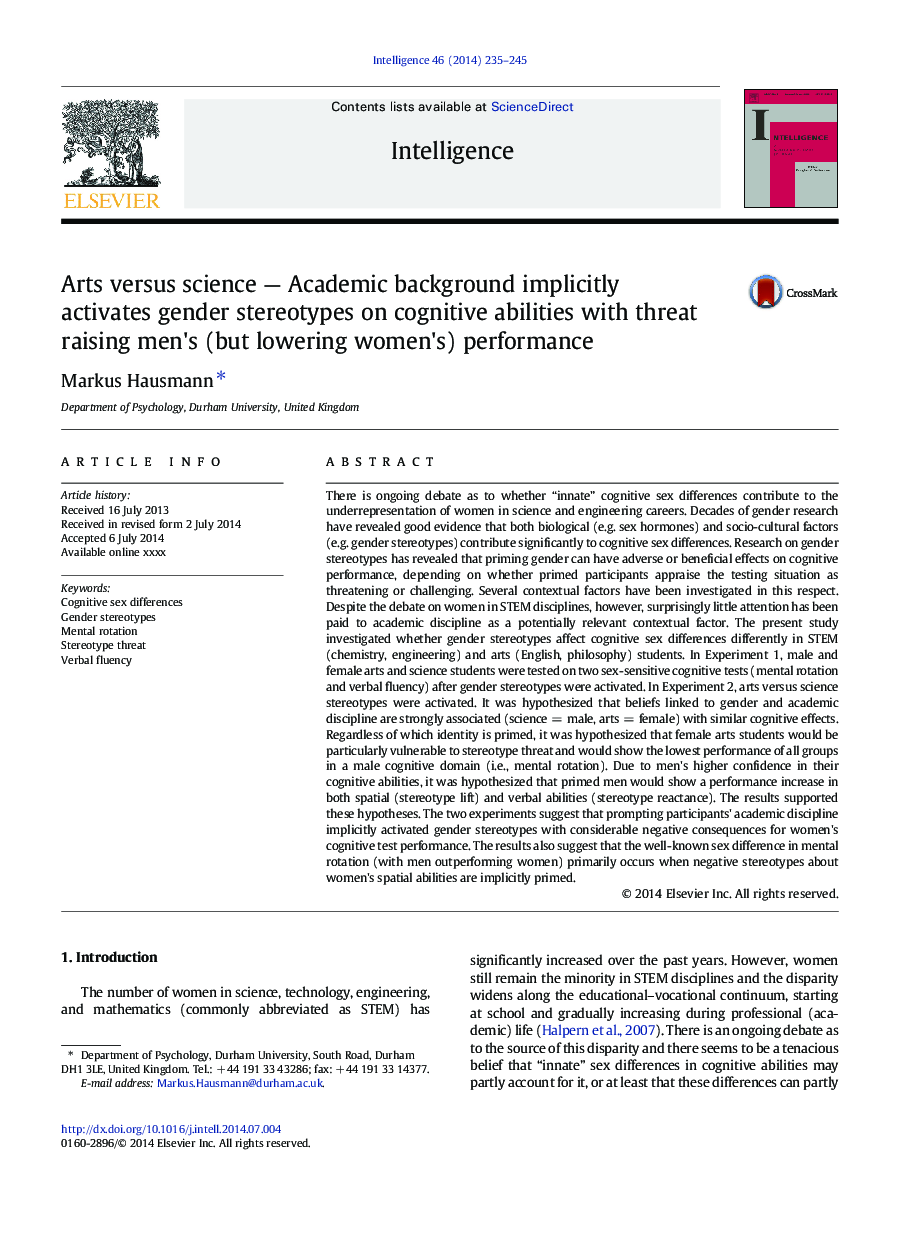| کد مقاله | کد نشریه | سال انتشار | مقاله انگلیسی | نسخه تمام متن |
|---|---|---|---|---|
| 7294378 | 1474270 | 2014 | 11 صفحه PDF | دانلود رایگان |
عنوان انگلیسی مقاله ISI
Arts versus science - Academic background implicitly activates gender stereotypes on cognitive abilities with threat raising men's (but lowering women's) performance
ترجمه فارسی عنوان
هنر در مقابل علم - پس زمینه علمی به طور ضمنی، کلیشه های جنسیتی را در توانایی های شناختی با تهدید بالا بردن عملکرد مردان (اما کاهش کارایی زنان) را فعال می کند
دانلود مقاله + سفارش ترجمه
دانلود مقاله ISI انگلیسی
رایگان برای ایرانیان
کلمات کلیدی
موضوعات مرتبط
علوم انسانی و اجتماعی
روانشناسی
روانشناسی تجربی و شناختی
چکیده انگلیسی
There is ongoing debate as to whether “innate” cognitive sex differences contribute to the underrepresentation of women in science and engineering careers. Decades of gender research have revealed good evidence that both biological (e.g. sex hormones) and socio-cultural factors (e.g. gender stereotypes) contribute significantly to cognitive sex differences. Research on gender stereotypes has revealed that priming gender can have adverse or beneficial effects on cognitive performance, depending on whether primed participants appraise the testing situation as threatening or challenging. Several contextual factors have been investigated in this respect. Despite the debate on women in STEM disciplines, however, surprisingly little attention has been paid to academic discipline as a potentially relevant contextual factor. The present study investigated whether gender stereotypes affect cognitive sex differences differently in STEM (chemistry, engineering) and arts (English, philosophy) students. In Experiment 1, male and female arts and science students were tested on two sex-sensitive cognitive tests (mental rotation and verbal fluency) after gender stereotypes were activated. In Experiment 2, arts versus science stereotypes were activated. It was hypothesized that beliefs linked to gender and academic discipline are strongly associated (science = male, arts = female) with similar cognitive effects. Regardless of which identity is primed, it was hypothesized that female arts students would be particularly vulnerable to stereotype threat and would show the lowest performance of all groups in a male cognitive domain (i.e., mental rotation). Due to men's higher confidence in their cognitive abilities, it was hypothesized that primed men would show a performance increase in both spatial (stereotype lift) and verbal abilities (stereotype reactance). The results supported these hypotheses. The two experiments suggest that prompting participants' academic discipline implicitly activated gender stereotypes with considerable negative consequences for women's cognitive test performance. The results also suggest that the well-known sex difference in mental rotation (with men outperforming women) primarily occurs when negative stereotypes about women's spatial abilities are implicitly primed.
ناشر
Database: Elsevier - ScienceDirect (ساینس دایرکت)
Journal: Intelligence - Volume 46, SeptemberâOctober 2014, Pages 235-245
Journal: Intelligence - Volume 46, SeptemberâOctober 2014, Pages 235-245
نویسندگان
Markus Hausmann,
